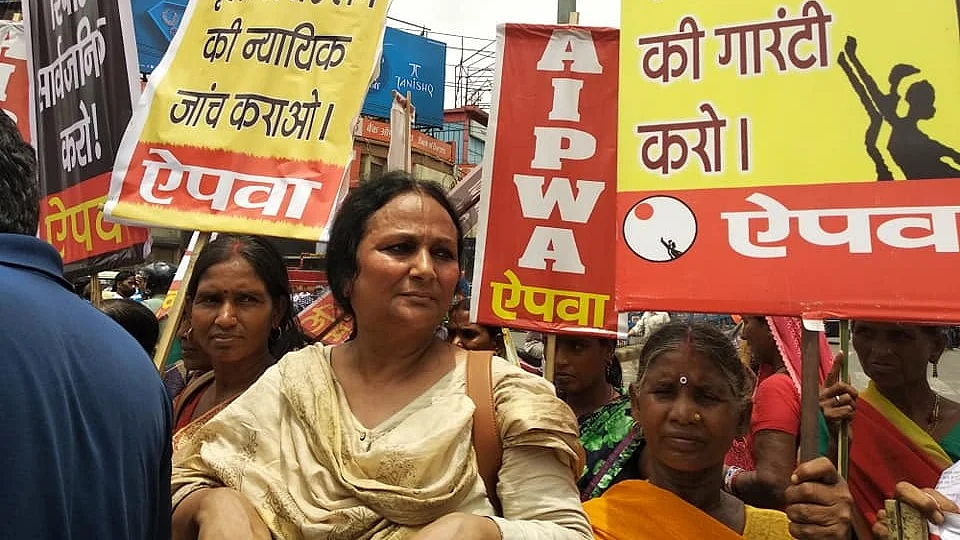Muzaffarpur shelter home case: Petitioner pins hope on SC-monitored probe
Nivedita Jha had challenged a previous Patna High Court order banning reporting of the case that involves sexual assault of 34 girls in an NGO-run state-funded shelter house in Bihar

Patna-based writer, activist and independent journalist Nivedita Jha—who had challenged the Patna High Court order banning media from reporting on the Muzaffarpur shelter home case—pins her hopes on the Supreme Court after the top court on September 20 decided to monitor the Central Bureau of Investigation probe into the case and ended the embargo on media reporting on the case.
Previously, the Patna High Court had expressed displeasure over leak of details of the investigation on August 23, asking the media to refrain from publishing them.
“The blanket ban by Patna High Court (on media reporting) was in violation of the ‘right to know’. But unfortunately, none of the journalists’ body opposed this order after the state government sent notices to the media outlets in Bihar. So I decided to move Supreme Court and yesterday’s ruling is quite reassuring,” Nivedita, who is president of Bihar chapter of South Asian Women in Media, told National Herald, welcoming the top court’s order.
“As a journalist and an activist, I have little faith in the CBI. We had been demanding that the probe be conducted under apex court’s monitoring in a time-bound manner,” she maintained, asserting that “a gag order in the case, where the children in the remand homes meant for their care and protection being subjected to sexual abuse, erodes the faith of the public in the state machinery.”
Pertinently, an audit report of government run children homes in Bihar was published by the Tata Institute of Social Sciences in April 2018, highlighting sexual exploitation of the children at the home. “It was only because of the pro-active role of the media, the incident became a national news,” she maintained, adding, “the role of the media was particularly laudatory in maintaining the fearless reporting of the incident despite the suspected involvement of senior bureaucrats and politicians.”
Subsequently, an FIR was registered and investigation was taken over by the state police and eventually transferred to the CBI.
On August 23, the Patna High Court had banned media reporting, holding that “Under the circumstances, till the investigation is completed, all the print and electronic media are hereby restrained from reporting anything with respect to the case, more particularly, with respect to the investigation already undertaken and/or which is likely to take place as it may seriously hamper the investigation of the case.”
Subsequently, advocate Fauzia Shakil filed a special leave petition on behalf of Nivedita in the apex court on September 5, arguing that “the effect of the order amounts to a blanket ban on any reporting anything regarding the case, thus preventing all other forms of reporting which may not even have any impact on the investigation like reporting on court proceedings, reporting the opinions of lawyers and activists involved in exposing the case, holding TV discussions on the issue and sensitisation of public.”
Media silence over gag order
But the petition, as is widely believed, was filed at a time when the journalists and media outlets in Bihar showed themselves in a poor light. No local journalists’ body or media outlet deemed it appropriate to either move the Patna High Court or appeal the Supreme Court to vacate the gag order.
While some journalists did express their disbelief and indignation at the High Court’s order, no protests were held, even while taking care to uphold the dignity and majesty of the court.
Incidentally, some Patna-based journalists had urged the Patna High Court to “reconsider and revoke” its order through a press statement. A local Hindi daily, part of a national media house, published an article, gently raising its voice against the court order. On August 30, 2018, it ran an article titled: “Akhbar khabarein chhapne ke liye hai, chhupane ke liye nahin (Newspaper is to publish news, not to hide).”
The recent media silence over gag order has reinforced general public perception in Bihar that the media largely remains content to kowtow to authority.
Supreme Court frees but cautions the media
A Supreme Court bench of justices Madan B Lokur and Deepak Gupta, observed on Thursday that “provisions under the Indian Penal Code, Protection of Children from Sexual Offences Act and Contempt of Courts Act are being routinely violated in the sense that an investigation is conducted independently by the print and electronic media and sometimes there is also a trial that is conducted and judgment in the form of a conclusion is also delivered by the media.”
Stressing that the entire issue needs to be balanced and looked at in the broader view of criminal justice and freedom of the press, the bench apprehended, “it is possible that there could be some mis-reporting and some persons who are not involved in an offence may be mistakenly taken as accused of an offence by the media.”
“We would need the assistance of the Press Council of India, the News Broadcasting Standards Authority, the Editors Guild and the Indian Broadcasting Federation. Accordingly, notice be issued to them returnable on October 4,” the bench maintained, lifting blanket ban on media reporting.
With inputs from Navendu Sharma in Patna
Follow us on: Facebook, Twitter, Google News, Instagram
Join our official telegram channel (@nationalherald) and stay updated with the latest headlines
